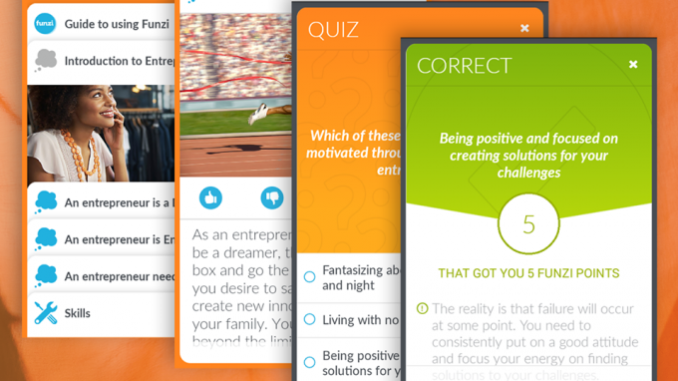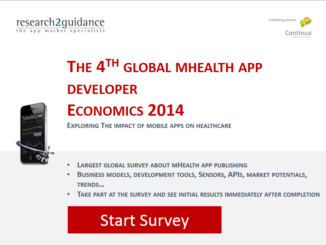
„Funzi produces a mobile learning and information service with an initial focus on emerging markets. Funzi’s services develop new skills and empower cocreation and collaboration between mobile users and experts.“
This information from the press material brought us to having a closer look at the project since the international mlearning market is in a continuous state of development. Here are the answers of Sophie Lafayette who is official representative for media/public relations of the app inventors who are located at Finland.
mz: The intention of the service Funzi is described as „helping users to start learning the skills to build their dreams”. What exactly does that mean?
Sophie Lafayette: Funzi provides services to develop skills that will be of immediate impact, improving the user’s professional and personal life and making it more meaningful. From our experience with Nokia’s Life Tools, we know that an average user uses multiple learning services, developing skills for everyday life, livelihood development and wellbeing.
With this in mind, Funzi delivers useful information, with revolutionary ease-of-use, to our user’s mobile device. New relevant and concise information, developed by industry experts, is delivered every day. This gives our users time to digest the material and for it to stay with them, ensuring the skills they learn practical and have a long term impact.
mz: Can you tell us something about the target group? Who are they and what can they learn with Funzi?
Sophie Lafayette: Funzi’s users are young, urban and peri-urban, mobile centric, and high achievers. A Funzi user is highly aspirational, with a desire to increase their affluence and change their current standard of life, they will have a good grasp of basic English, have access to a smartphone, and use data.
By delivering content to develop the skills and attitude required to be a successful entrepreneur and leader, our first major learning deck, ‘Entrepreneurship 101’ encourages the creation of new companies and jobs in emerging markets. In early December, this will be followed by a course that gives the user the personal skills to gain their dream job. Additional decks will be released on a rolling basis, allowing our users to continue to build their practical personal and professional skills.
mz: How does Funzi work? In what way is a system with cards you read and quizzes a modern form of mobile learning? Shouldn’t there be other tools, too?
Sophie Lafayette: Until now, mobile technology solutions have tended to focus on the group, Funzi focuses on the individual and their needs for learning and services, as well as how this is delivered. Funzi is designed to make an impact in education and is a pedagogically solid mix of information and learning services combined with conversation tools. Every Funzi service consists of Learning Packages which address learning around various themes along with the right behaviours, attributes, and values for success in all spheres of life.
The second component in each service are Motivational Packages that focus on informing about the mind-set required for a successful user via providing access to curated success stories, influencer voices, and latest news around the subject at hand.
mz: The app has a focus on collaboration which corresponds to the fact that individuals like to learn from each other and most effective through interaction. How does that work in Funzi?
Sophie Lafayette: The collaboration aspects of the Funzi application are an area that will be extensively developed, with features released on a rolling basis. Currently the application has sharing incorporated, and users can encourage friends and family to start learning with them. We are in the process of utilising WhatsApp to create learning groups based on location and deck, where users can discuss topics with peers.
Through quizzes, users are awarded points for correct answers. Gamification (including elements such as badges, certifications etc. based on content in the deck & partners) will be introduced into this interplay in the future, encouraging user engagement and social interactions, such as sharing with personal and wider networks.
mz: What was the reason for testing the beta-version in african countries?
Sophie Lafayette: From our experiences on the African continent, we have seen the rapid expansion of mobile use, a fact also supported in the media (by both traditional and technology focused journalists*). Our lead-in markets have over 800 million smartphone users in 2013 and an estimated future user base of over 2.2 billion, the majority of these phones are Android phones, particularly in Africa, and this is the reason we have developed the application for Android first.
In addition to developing content with local partners, we also work with these organisations to promote the Funzi platform. Through out network & experience with innovation hubs and organisations on the continent, we began our beta testing in South Africa and Tanzania, working closely with RLabs (including user testing) and Kinu Innovation Hub, where members represent our target users.
mz: What kind of experts were asked to create the learning content for the app? Are they practitioners from the industry? Do they come from special branches or are they from educational institutions?
Sophie Lafayette: Funzi’s strategy is to create globally relevant services and implement them locally in collaboration with local partners, including accelerators and incubators, as well as universities and other institutions that have an interest to enhance the local learning ecosystems. Examples of our current and prospect partnerships include collaborating with AaltoES, Plan, Jolla, Demos Helsinki, IFC, Kone Centennial Foundation, RLabs, Kinu, TanzICT, and Western Cape Government.
The content of our first major service, Entrepreneurship 101, has been created in collaboration with the AaltoES, the original creators of the Finnish startup-ecosystem that has produced Startup Sauna and SLUSH. Examples of additional current content developed by industry experts include ‘Rights of the Child’ developed in co-operation with Plan International, and ‘We are Unlike’ developed in co-operation with Jolla.
mz: Presenting your own product in a way that promises “revolutionary easy-of-use” is a very special announcement: this might be deciding about the success of the app since good usability is a door opener. What is this revolution about?
Sophie Lafayette: Funzi uses the playing card metaphor, concept that is well known to the majority of the world’s population, widely accepted and used by educators everywhere. Each deck is broken down into smaller, easily understood and digestible sections with a built-in social component intrinsic to its design. Following reading and understanding a card, the user may have the opportunity to answer a quiz question, receiving instant confirmation of what they have learnt and understood. We believe that Funzi’s UX metaphor on mobile creates the first globally scalable and relevant learning method.
mz: Do you have further plans to develop the app in the future and add features? Which ones could these be?
Sophie Lafayette: Funzi launched with a limited functionality set because we wanted to ensure our users responded to the core UX and content, user and partner feedback is key in our development, to verify our approach and guide future development. We will be continuing to develop our business logic and model with practical and scientific research, collaborating with accelerators, incubators and other existing communities. Our goal is to create scalable and repeatable business processes with predictable outcomes, in working with partners including corporates, NGOs, Governmental organizations, and MNOs.
The next major learning deck released will be Life Skills [Social and Interpersonal Skills & Preparing for Jobs], and this will go live in December, and some short-term feature releases include star rating and progress report in November and new content formats and animations in December. In addition to rolling out new learning decks with practical content, we see gamification as important in user engagement and retention and this is an area in which we will be developing substantially.
*Further links for reasons on testing the app in Africa:
- The real mobile revolution: Africa’s smartphone future
- Internet use on mobile phones in Africa predicted to increase 20-fold
- Africa continues going mobile
- In 3.5 years, most africans will have smartphones
Link for downloading the app: http://www.funzi.fi/
Copyright on pictures in this article lies at funzi.fi, thank you.






Kommentar hinterlassen